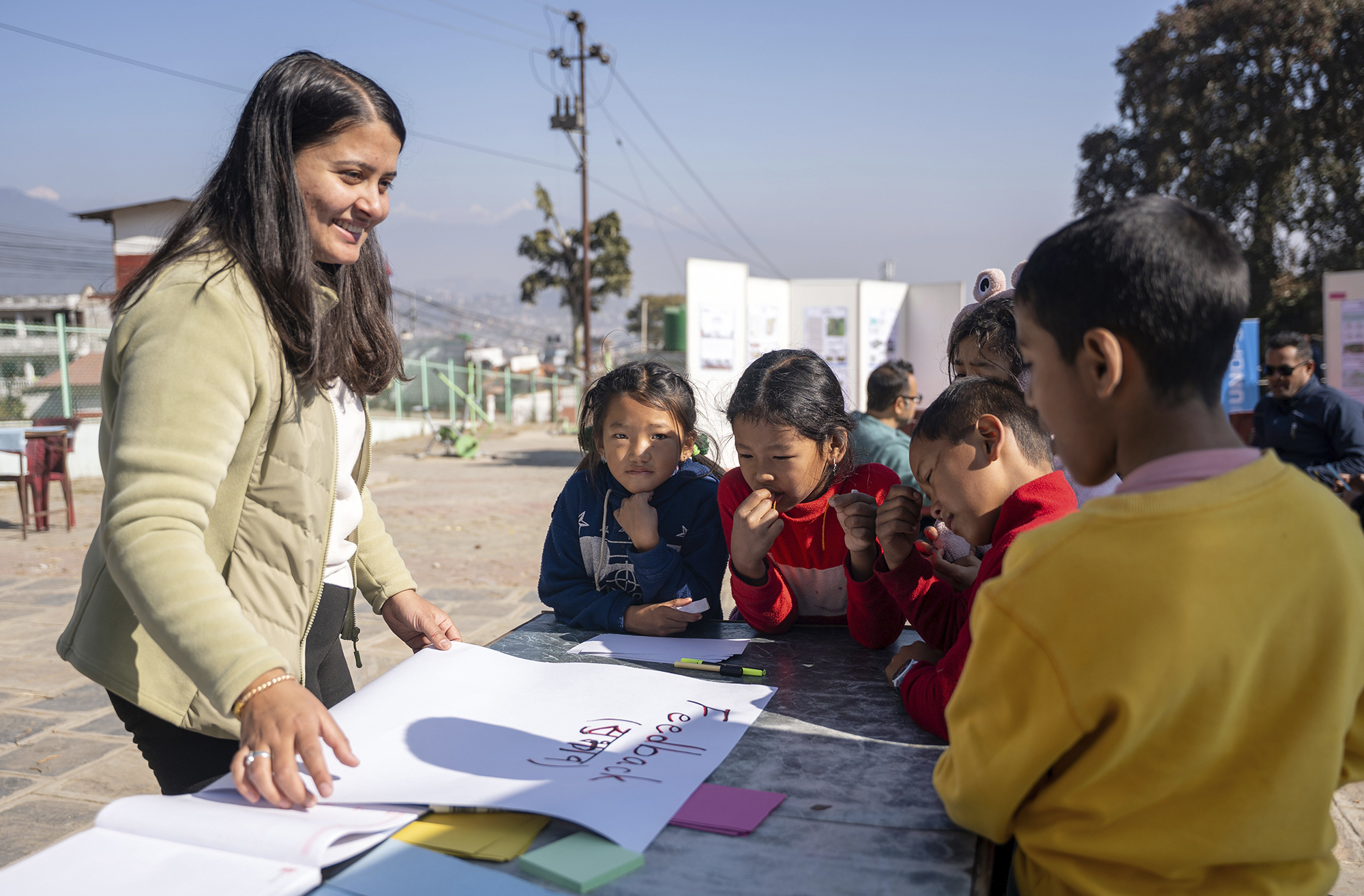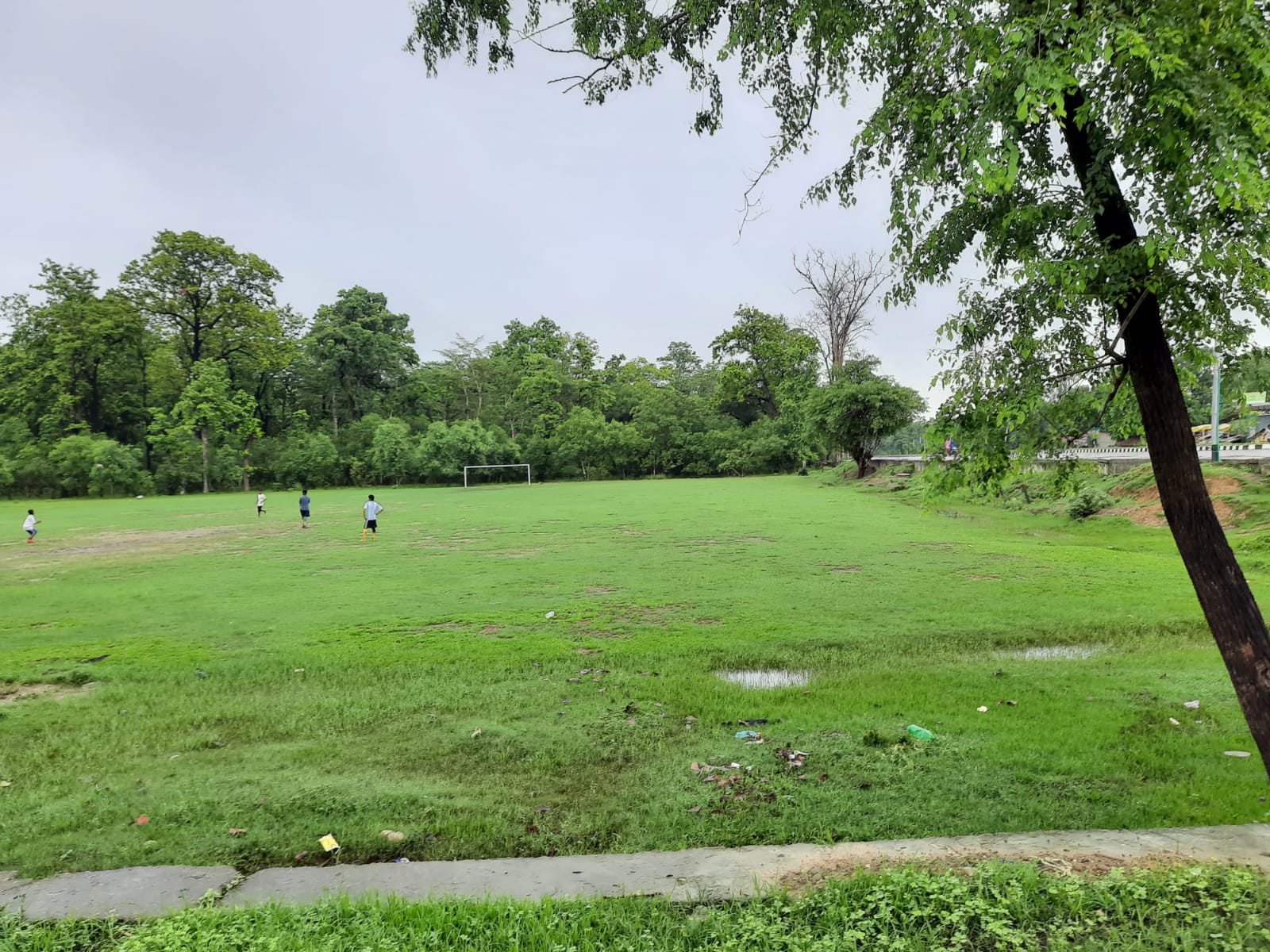Welcome to our first triannual update providing news on the activities of the Cities Alliance JWP on Cities and Migration. We aim to share information about our global advocacy efforts, projects, and knowledge on the role of cities in managing migration. It is also a space for facilitating exchange, and we encourage members to share their migration-related news, events and activities.
GLOBAL ADVOCACY
Cities Alliance to Host Learning Exchange on Secondary Cities and Migration at the World Urban Forum
The 10th World Urban Forum (WUF) is taking place in Abu Dhabi, United Arab Emirates, from 8-14 February 2020. As the world’s premier urban gathering, the JWP on Cities and Migration will be using the opportunity to promote the role of secondary cities in managing migration and help ensure that the city perspective is heard.
Through the JWP, Cities Alliance is organising a side event titled “How secondary cities can accommodate the needs of urban population growth: Areas of cooperation for local, national, and global actors in improving migration management in secondary cities of low-income countries.”
Cities are expanding at different rates, and some are growing very rapidly. If well managed, migration to secondary cities can have a significant impact on poverty reduction and reduced inequalities, even more so than migration to primary cities. Longitudinal research in Tanzania has found that the share of changed poverty headcount of migrants going to secondary cities was double that of migrants going to primary cities, largely due to the sheer number of people coming to secondary cities. By planning for orderly urban expansion, this impact can be further enhanced.
The discussion will feature first-hand experiences from Ethiopia and Uganda, and how secondary cities in both countries are working to manage large numbers of migrants. It also provides an opportunity for city, national and global stakeholders to discuss how they are accommodating the needs of urban population growth.
The session will take place on 11 February from 12:30 to 1:30 in Room #5. We hope you can join us there.
JWP Steering Committee to Hold Second Meeting in Abu Dhabi
UN-Habitat will host the JWP’s second Steering Committee meeting at the WUF site in Abu Dhabi on 11 February from 6:30pm to 8pm in Room CS4. Co-chaired by SDC and the Cities Alliance, the meeting will provide members a chance to provide updates on their respective activities. The Cities Alliance Secretariat will then initiate a discussion on increasing support to secondary cities that manage large numbers of refugees. This is a critical policy issue, as many municipalities have expressed concern that they are not able to cope with the increased number of residents in their jurisdictions, and it was raised during the first Steering Committee meeting in Milan in July 2019.
The discussions in Abu Dhabi aim to deepen the debate and explore solutions. We hope that the Steering Committee will use the Cities Alliance as a platform to advocate for the needs of these cities, with the support of their respective national governments.
Exhibition Gives Voice to Urban Migrants at WUF
One of the essential goals of the JWP on Migration and Cities is to promote a positive narrative on migration and how it can benefit cities, with data and knowledge to support this position. Two members of the JWP – UN-Habitat and United and Cities Local Governments (UCLG), along with UNICEF and the Mayors’ Migration Council – are taking advantage of the spotlight offered by the World Urban Forum to launch an audio-visual exhibition that aims to contribute to changing the narrative on migration.
Titled “Capturing Voices of Migrants in Cities,” the exhibition features migrants telling their stories and describing their realities. In their stories, migrants explain what the most enabling factors were for their social, spatial and economic inclusion and who supported them when they first arrived.
By giving migrants a face and a voice, the exhibition aims to reduce xenophobia by introducing migrants and their personal stories and underlining the role of local actors and decision-makers for social cohesion and inclusion. It is also designed to raise awareness on the importance of inclusive governance systems, the need for coordinated service provision, and spatial planning that is necessary for migrants’ inclusion in cities (and positively impacts the lives of all urban dwellers in the process).
If you’re at WUF, be sure to check out the exhibit. For more information, check out this brochure (to which Cities Alliance contributed photos) on the exhibition and its website at https://voicesofmigrantsincities.wordpress.com/.
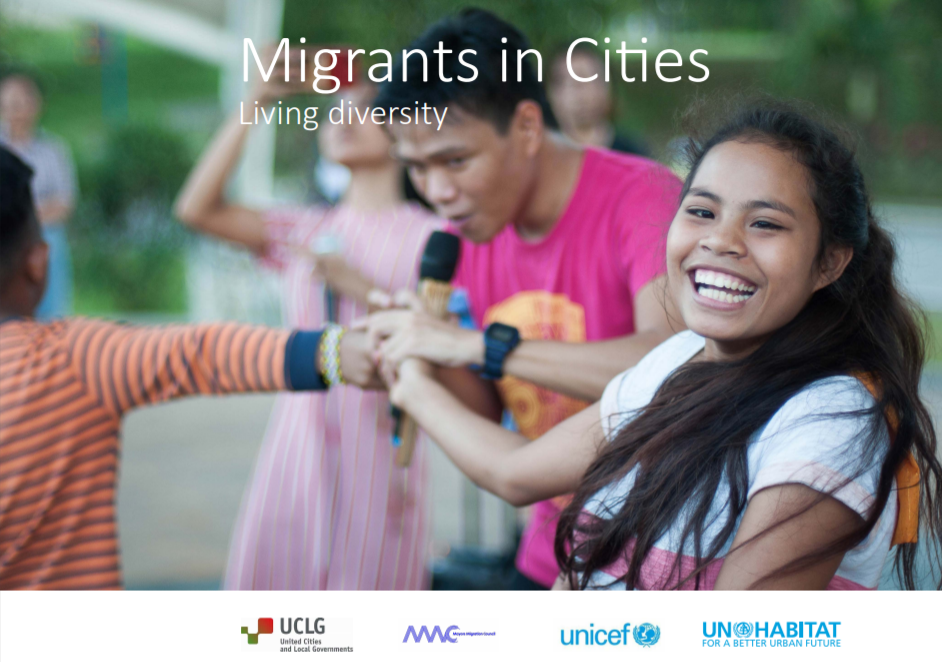
UN-Habitat and UCLGA Spotlight Migration in LAC and Africa at the Global Forum on Migration and Development
One of the great strengths of the Cities Alliance JWP is that it mobilises and convenes members with different areas of expertise to maximise the global reach of its key messages in support of cities and migration. This was evident at the Global Forum on Migration and Development (GFMD), the world’s largest forum for dialogue on migration and development that took place in Quito, Ecuador 20-24 January 2020.
UN-Habitat’s Regional Office for Latin America and the Caribbean (LAC) hosted an event titled “The Impact of Migration in Latin American Cities, on the Way to the X World Urban Forum” on Tuesday, 21 January 2020. It featured presentations on successful practices to reduce the negative impact of migration on host communities, with an emphasis on the need to better link humanitarian aid to a long-term development approach.
The discussion highlighted the greatest challenges for cities facing migratory flows, particularly providing sufficient basic goods and services for the population and regularising employment for refugees and migrants. It also addressed the potential opportunities presented by migration, such as innovation and the enrichment of a country's diversity and productivity, and the need for a positive view on migration. Panelists introduced steps that cities should follow to move from the emergency response approach towards strategies for socio-economic development and integration of refugees and migrants to host communities.
Key messages emerging from the session included the need to strengthen the development agenda at the local level, and the fact that integration into social policies requires full recognition of rights in national frameworks. In addition, while there are capacities at the local level, the impact on smaller municipalities and secondary cities in border areas or near a metropolis is very significant, and there is little metropolitan coordination.
United Cities and Local Governments of Africa (UCLG Africa) organised a breakout session on 22 January devoted to migration in Africa titled “The Governance of Migration in the Cities Along Migration Routes: Responses and Attitudes of Local and Regional Authorities in Africa.” Cities Alliance facilitated the session, which focused on the issue of hotspots in transit cities located along migration routes in Africa and how to support local and regional authorities in welcoming and receiving migrants. The discussion also drew on the experience of Latin American cities to identify challenges and opportunities for strategies to make cities more resilient to migration flows. As with UN-Habitat’s session, promoting a positive narrative on migration was a key message of the UCLGA event.
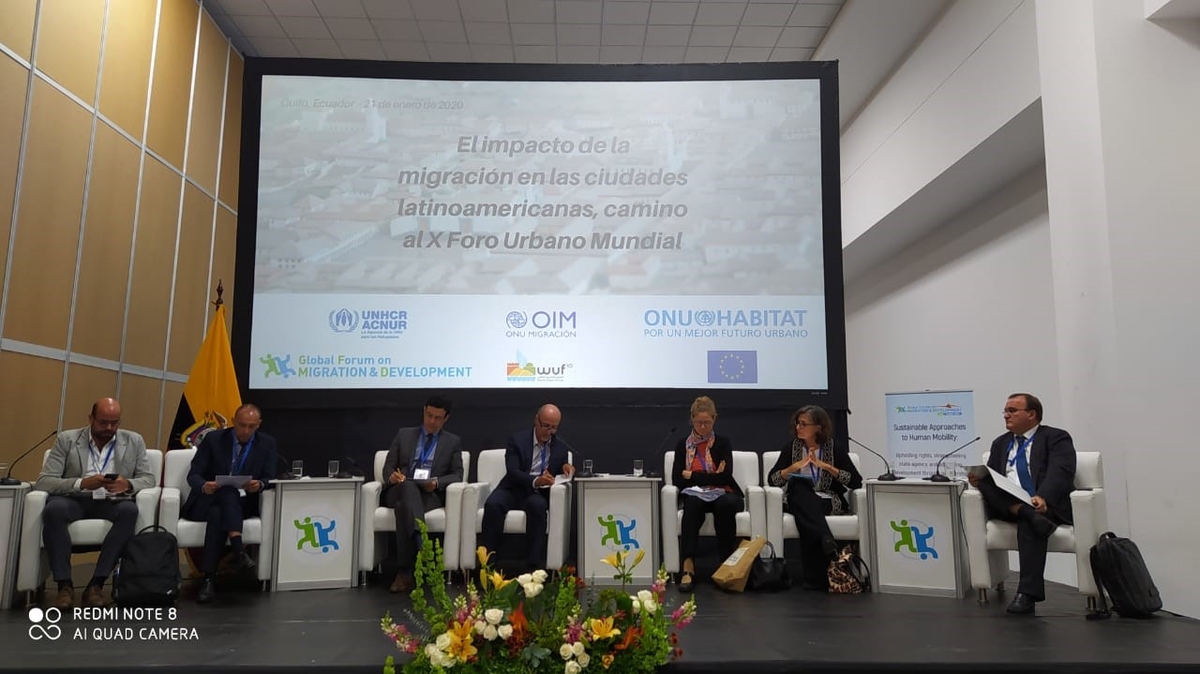
Cities Alliance as a Voice for Cities at the Global Refugee Forum
In December, the first-ever Global Refugee Forum (GRF) convened in Geneva, Switzerland. Organised by UNHCR, the event brought together development partners to discuss long-term action on how to help the estimated 25.9 million refugees worldwide. Cities Alliance’s participation at the Forum highlighted the critical role cities play in managing refugees and drew much-needed attention to the city perspective, which is often overlooked.
To that end, Cities Alliance – working through the JWP – sought to include the city perspective in discussions. Samuel Mabala, representative of the Cities Alliance Uganda country office, participated in a spotlight session on “Realising Inclusion with City and Refugee Leaders” on behalf of the Hon. Isa Kato, Mayor of Arua, Uganda, who was unable to attend.
The session highlighted the bold action that cities and refugee leaders are taking to welcome and integrate newcomers, demonstrating the critical need for local level buy-in and mayoral commitment to the success of the Global Compact for Refugees. It also explored challenges for accelerating and scaling up local efforts – the need for national support of local action, local access to international development financing, local capacity building and technical assistance, and sustaining community dialogues, among others. The spotlight session was cosponsored by the Government of Switzerland, the Mayor Migration Council (MMC), the G100 Initiative, and the Diaspora Networks Alliance (DNA).
More about Cities Alliance at the GRF: https://www.citiesalliance.org/newsroom/news/cities-alliance-news/cities-alliance-voice-for-cities-global-refugee-forum
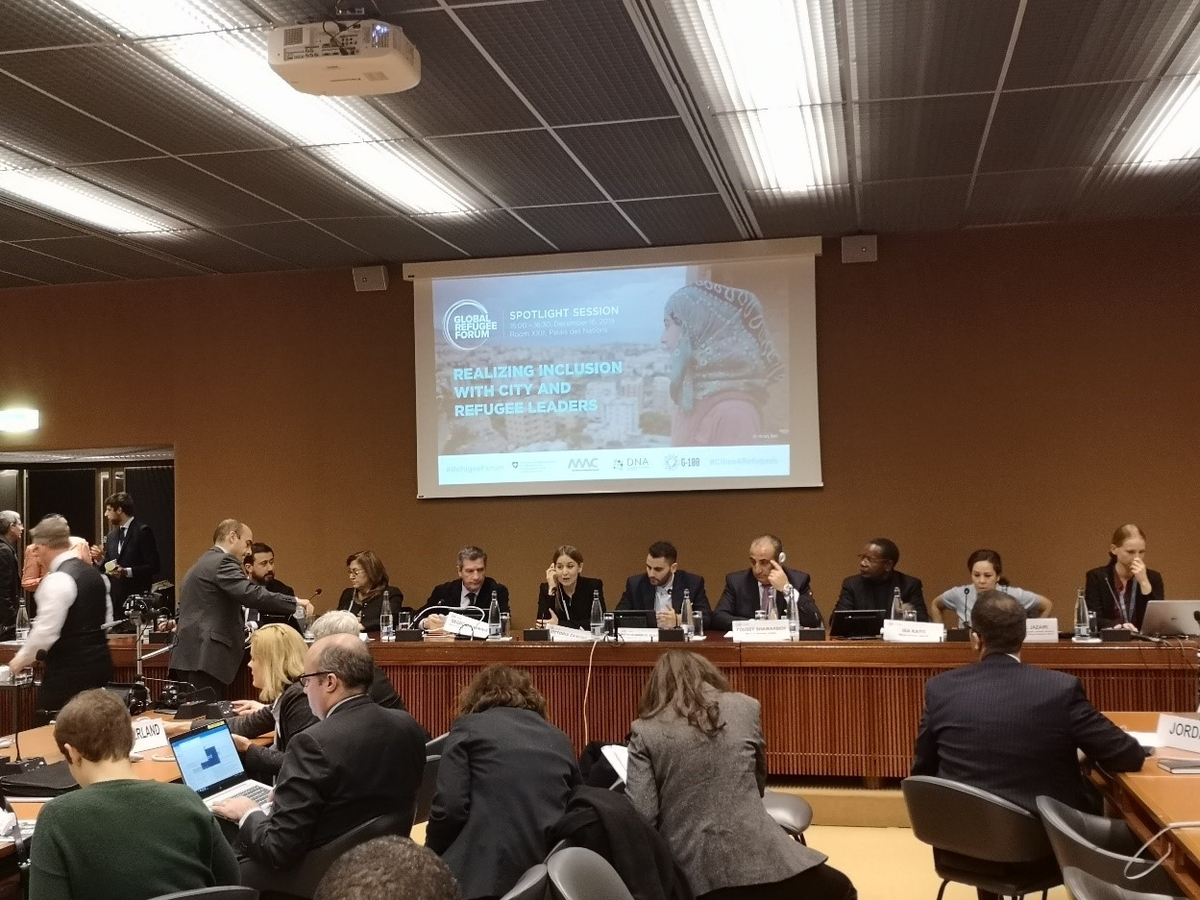
UN-Habitat and Partners Hold First East African Dialogue on Migration and Development in Refugee-Hosting Cities
In cooperation with the United Nations Capital Development Fund (UNCDF) and supported by IOM and other partners, UN-Habitat hosted the first East African Regional Dialogue on Migration and Development in refugee and migrant-hosting cities from 22-23 October in Entebbe, Uganda. Cities Alliance participated in the event as part of the JWP.
The two-day dialogue provided a platform for exchange on experiences regarding migrants’ inclusion in the East African Region, which is one of the world’s most impacted by migration. UN-Habitat provided inputs on how to plan, govern and finance sustainable urban growth for inclusive and welcoming cities. UNCDF shared best practices for increasing entrepreneurship opportunities that can facilitate livelihood generation for both migrant and host communities, while IOM introduced its social cohesion projects in the region.
With panel discussions and thematic working groups, the dialogue strengthened the exchange between national and local authorities of the participated countries. To conclude the dialogue, participants developed tailored action lists for their specific country contexts for fostering social cohesion and local economic development through entrepreneurship and participatory planning processes.
Originally published by UN-Habitat at: https://unhabitat.org/un-habitat-and-partners-hold-dialogue-on-migration-and-development-in-cities-hosting-refugees
PROJECTS
Pilot Projects Underway in Nine Cities
The JWP is engaging with nine cities across five partner countries to implement activities designed to help cities better manage migrants. The cities are Adama and Jigjiga, Ethiopia; Amatitlán and San Marcos, Guatemala; Kakuma-Kalobeyei in Kenya; Jendouba and Kairouan, Tunisia; and Arua and Jinja, Uganda. In recent months, grant agreements have been signed for all nine pilots, baseline surveys conducted, and implementation begun.
The JWP activities are designed to benefit both migrants and host communities and centre around three focus areas: Cities and inclusive migration governance, cities and labour migration, and cities and forced migration. While the activities are tailored to the needs and contexts of each city, they typically include building an evidence base on urban migration; collaborating with local authorities, civil society, and the private sector; and creating space for stakeholder dialogue on migration issues. The projects run from either November or December 2019 through the end of 2021.
The projects are:
ETHIOPIA
- Adama: Improving the Reception, Management and Integration of Rural-Urban Migrants with a Registration Scheme, Resource Centre, Networking, and Infrastructure Development. Implementing partners: the Adama Science and Technology University (ASTU) and the Adama City Level, Labour and Social Affairs Office.
- Jigjiga: Diaspora Engagement for City Development: Institutionalising the Concept of Migration and Development into Plans and Actions. Implementing partners: Jigjiga University and the Regional Investment and Diaspora Affairs Bureau of the Regional Government Council of the Ethiopian Somali Region.
KENYA
- Kakuma-Kalobeyei: Sustainable Economic Development Along the Turkana West Development Corridor Through Enhanced Connectivity. Implementing partners: UN-Habitat with the Ministry of Transport, Infrastructure, Housing and Urban Development; the Turkana County Government; the LAPPSET Corridor Development Authority; and the Refugee Affairs Secretariat.
UGANDA
- Arua: Strengthening Mechanisms for Receiving, Managing and Integrating Involuntary Migrants Within the Arua Municipal Council. Implementing partners: the AVSI Foundation with Arua Municipal Council (AMC) and the Uganda Bureau of Statistics (UBOS).
- Jinja: Strengthening Capacity for Urban Migration Management and Improving Migrant Livelihoods in Jinja City, Uganda. Implementing partners: the Jinja Municipal City Council, Makerere University, and the slum dweller organisation ACTogether.
TUNISIA
- Jendouba and Kairouan: Promoting Responsible Tourism for Better Economic, Social and Cultural Integration of Migrants. Implementing partners: the National Union of Tunisian Women in Kairouan and the Association of Women, Youth and Children in Jendouba, in collaboration with the tourism sector.
GUATEMALA
- Amatitlán: Amatitlán Includes You: Reception, Management and Integration of Labour Migrants in the City. Implementing partners: the AVINA Foundation with the Municipality of Amatitlán and the Municipal Development Council (COMUDE).
- San Marcos: Thriving in San Marcos - Prosperandos En San Marcos, an innovative two-year strategy to leverage remittances for local economic and human development in San Marcos, Guatemala. Implementing partners: the Inter-American Dialogue with banks and credit cooperatives
PARTNERSHIP
AVSI Responds to the Crisis of Venezuelan Refugees in Brazil
It is estimated that approximately 4.5 million Venezuelans have fled as a result of the political turmoil, socio-economic instability and humanitarian crisis in their country. Since 2018, the international community has been actively involved in supporting the host countries bearing the burden of the refugee and migrant crisis. As of October 2019, around 212,000 Venezuelans sought refuge in Brazil (UNHCR). The town of Pacaraima, along Brazil’s northern border with Venezuela in the state of Roraima, is the main point of entry with an average of 598 people arriving daily.
AVSI works in Brazil both in reception sites and in integration actions in urban settings. We started in 2018 managing two centres in Boa Vista, and we have expanded the partnership with UNHCR to manage eight shelters (one in Paracaima and seven in Boa Vista, Roraima State), with the aim of helping to ensure access to basic services and the distribution of food and the non-food items. We also seek to facilitate access to the health system and foster committees to ensure community participation within shelters. AVSI now manages eight shelters that benefit more than 20,000 Venezuelan refugees through the Federal Government Programme, in partnership with UNHCR and with funding from Italy.
Socio-economic integration is important for the sustainable integration of refugees into the social and economic life of the country and to alleviate the overcrowding in the reception shelters near the border. It means multi-stakeholder partnerships that involve local public actors (government and municipality), civil society and the private sector to create employment opportunities for refugees and migrants with necessary social support.
On 1 October 2019, AVSI Brasil, in partnership with the Migration and Human Rights Institute (IMDH), launched a new project in Brazil called Promoting Integration Through Employment of Venezuelan Refugees and Migrants and Other Vulnerable Persons. The project, funded by the U.S. State Department’s Bureau of Population, Refugees and Migration (PRM), will reach 9,600 beneficiaries directly and 35,000 indirectly over two years. Its main goal is to guarantee the rights of Venezuelan refugees and migrants living in Brazil in support of the humanitarian emergency programme Operação Acolhida (Operation Welcome), led by the Brazilian Federal Government with UNHCR.
Through the project, AVSI aims to improve access to formal work for Venezuelan refugees and migrants, as well as the most vulnerable sectors of the Brazilian population. We also seek to facilitate the voluntary relocation of refugees and migrants currently hosted in the cities of Boa Vista and Pacaraima.
AVSI is leading a multi-stakeholder effort for greater long-term sustainability and positive impact. Private companies, such as Industrias San Miguel and Sodexo, will be engaged directly, matching business needs for a skilled and motivated workforce with employees, both among the Venezuelan migrants and host population. Civil society organisations will support social integration of migrants during relocation. The government of Brazil will remain a leading actor, both at national and local levels, for coordination and streamlining of priorities and resources.
By Franco Argelli, Migration and Integration Focal Point – AVSI Foundation
KNOWLEDGE
Report on the JWP’s Inaugural Learning Exchange
Knowledge sharing among partners is a core component of the JWP, and regular learning exchanges are an important forum for discussion and a good way to help build a learning network. The JWP convened the first of these learning events for its four partner countries (Ethiopia, Kenya, Tunisia and Uganda) in Bern, Switzerland on 9 and 10 September 2019. The event brought together 25 participants from the four countries – including representatives from national ministries, local government, the private sector, host communities and refugee-led organisations – to discuss how they can work together to improve management of migration to cities.
The idea behind this exchange was to explore migration within the context of a system of cities and improve cooperation and peer learning among city and migration stakeholders at the local, national, and international levels. The exchange incorporated firsthand experience by cities that are dealing with migration, with a focus on the JWP’s identified partner cities (Arua and Jinja in Uganda, Jendouba and Kairouan in Tunisia, Jigjiga and Adama in Ethiopia, and Kakuma-Kalobeyei cluster in Kenya).
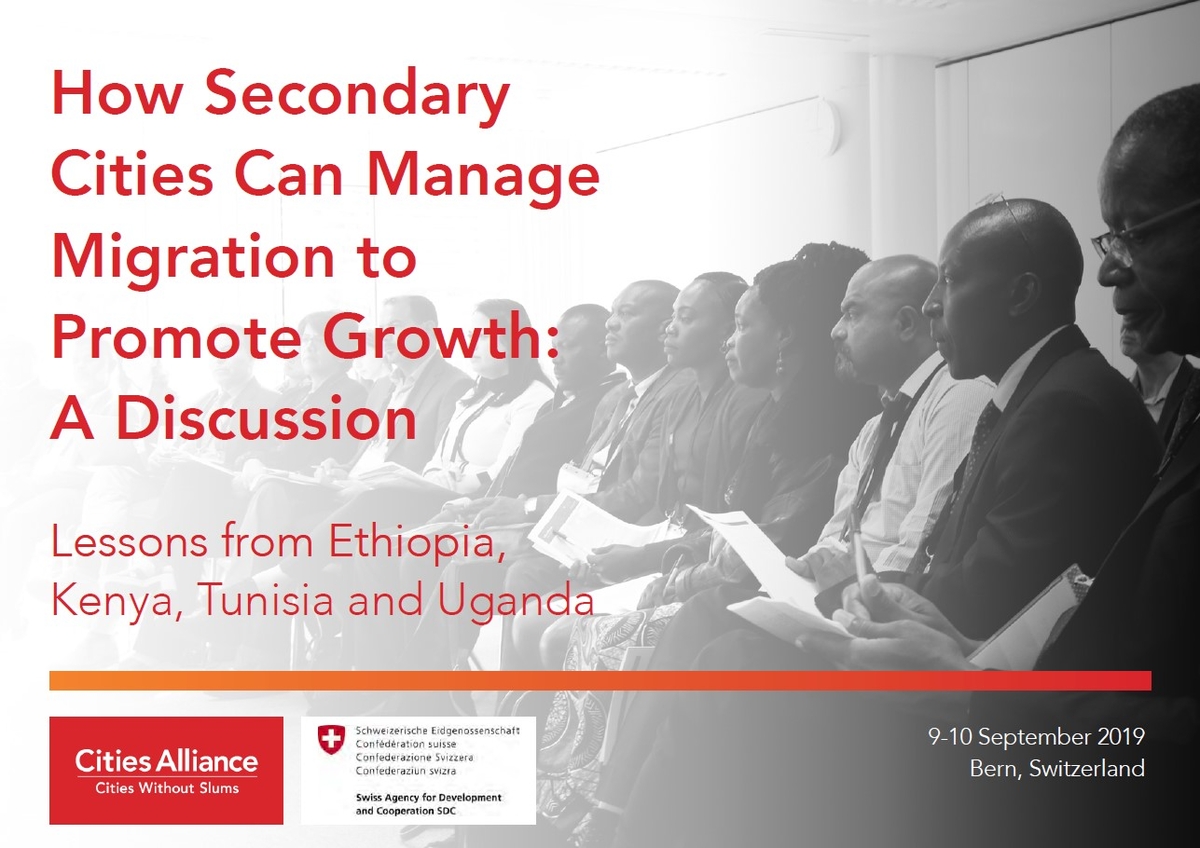
The discussions highlighted the tremendous impact migration is having on secondary cities and the challenges they face in providing basic services for existing and new residents. Above all, secondary cities need support and are want their voices to be heard at the national level so they can meet residents’ needs and drive growth. The key messages have been distilled into a report titled How Secondary Cities Can Manage Migration to Promote Growth: A Discussion. Lessons from Ethiopia, Kenya, Tunisia and Uganda.
Download the report: https://www.citiesalliance.org/sites/default/files/2020-01/Migration_PeerLearningEvent_Report_Final_Reduced.pdf
ABOUT THE JWP ON CITIES AND MIGRATION
The Cities Alliance Joint Work Programme on Cities and Migration is funded by the Swiss Development Cooperation (SDC). It aims to generate new knowledge, promote analytical and collaborative approaches to key urban issues, and improve urban practices and policies related to cities and migration. It also aspires to become a local, national, and international coordination platform, knowledge hub and think tank for advocating new thinking on migration. The programme is designed to help cities and countries contribute directly to global agendas, including Agenda 2030 and the Global Compacts for Migration and for Refugees.
More information on the Cities and Migration JWP can be found at: https://www.citiesalliance.org/how-we-work/our-operations/joint-work-programmes/jwp-cities-and-migration
CONTACT US
For more information about the JWP or to contribute an article, please contact Florence Lozet at flozet@citiesalliance.org


